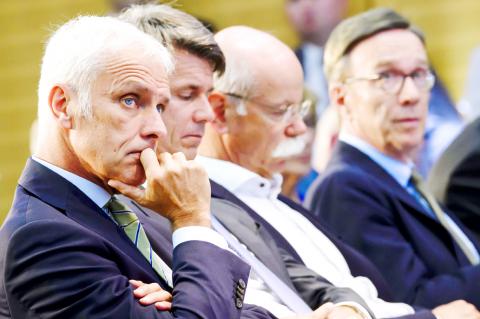Switzerland is to demand that German automakers treat Swiss customers the same as German buyers of diesel cars being fixed to cut pollution, Swiss Federal Roads Office Director Juerg Roethlisberger said.
The comments by add pressure on carmakers like Volkswagen AG, BMW AG, Daimler AG, Audi and Porsche, which this week agreed to overhaul engine software on 5.3 million diesel cars and try to repair the sector’s battered reputation.
Politicians in Germany stopped short of demanding costly mechanical modifications to engine and exhaust systems.

Photo: EPA
“I can guarantee you that we will certainly demand the same for Swiss customers that German customers get,” Roethlisberger told broadcaster SRF in an interview aired on Saturday.
Swiss authorities would monitor the situation to see what the proposed fixes bring and if public pressure forces German carmakers to take the more costly step of replacing hardware on affected cars, then Switzerland would demand the same, he said.
NO BAN
Roethlisberger dismissed calls from Swiss environmentalists and center-left politicians to ban the import of certain diesel vehicles on the grounds that their nitrogen oxide emissions posed a health hazard.
Swiss prosecutors last year opened criminal proceedings and seized evidence from the AMAG dealership network after a court ruled Swiss investigators must conduct their own investigation of an emissions scandal at Volkswagen.
AUDI IMPLICATED
Meanwhile, Bavaria state prosecutors in Munich made Audi a party to the diesel-emission probe, a step that might allow the seizure of profits the company made from selling vehicles with rigged engines.
Munich prosecutors investigating Audi employees for fraud have formally added the carmaker to a related inquiry looking into whether executives neglected their supervisory duties allowing the cheating to happen, Karin Jung, spokeswoman for the investigators, said in an e-mailed statement.
The review will be handled under administrative rules that allow for sanctioning wrongdoing at companies.
While Germany does not allow for prosecution of companies under criminal laws, an administrative probe is the tool prosecutors can use to sanction firms.
The rules allow authorities to seize profits made through illegal conduct.
Siemens AG, which faced the same type of review during a corruption probe about a decade ago, settled with Munich prosecutors for 600 million euros (US$706 million).
Audi was notified about the step and will continue to work constructively with prosecutors, company spokesman Oliver Scharfenberg said on Saturday.
Volkswagen is already facing the same type of review by Braunschweig prosecutors.
The company in September 2015 admitted that about 11 million diesel vehicles worldwide were sold with so-called defeat devices.
Additional reporting by Bloomberg

PATENTS: MediaTek Inc said it would not comment on ongoing legal cases, but does not expect the legal action by Huawei to affect its business operations Smartphone integrated chips designer MediaTek Inc (聯發科) on Friday said that a lawsuit filed by Chinese smartphone brand Huawei Technologies Co (華為) over alleged patent infringements would have little impact on its operations. In an announcement posted on the Taiwan Stock Exchange, MediaTek said that it would not comment on an ongoing legal case. However, the company said that Huawei’s legal action would have little impact on its operations. MediaTek’s statement came after China-based PRIP Research said on Thursday that Huawei filed a lawsuit with a Chinese district court claiming that MediaTek infringed on its patents. The infringement mentioned in the lawsuit likely involved

Taipei is today suspending work, classes and its US$2.4 trillion stock market as Typhoon Gaemi approaches Taiwan with strong winds and heavy rain. The nation is not conducting securities, currency or fixed income trading, statements from its stock and currency exchanges said. Authorities had yesterday issued a warning that the storm could affect people on land and canceled some ship crossings and domestic flights. Taiwan Semiconductor Manufacturing Co (TSMC, 台積電) expects its local chipmaking fabs to maintain normal production, the company said in an e-mailed statement. The main chipmaker for Apple Inc and Nvidia Corp said it has activated routine typhoon alert

GROWTH: TSMC increased its projected revenue growth for this year to more than 25 percent, citing stronger-than-expected demand for AI devices and smartphones The Taiwan Institute of Economic Research (TIER, 台灣經濟研究院) yesterday raised its forecast for Taiwan’s GDP growth this year from 3.29 percent to 3.85 percent, as exports and private investment recovered faster than it predicted three months ago. The Taipei-based think tank also expects that Taiwan would see a 8.19 percent increase in exports this year, better than the 7.55 percent it projected in April, as US technology giants spent more money on artificial intelligence (AI) infrastructure and development. “There will be more AI servers going forward, but it remains to be seen if the momentum would extend to personal computers, smartphones and

Catastrophic computer outages caused by a software update from one company have once again exposed the dangers of global technological dependence on a handful of players, experts said on Friday. A flawed update sent out by the little-known security firm CrowdStrike Holdings Inc brought airlines, TV stations and myriad other aspects of daily life to a standstill. The outages affected companies or individuals that use CrowdStrike on the Microsoft Inc’s Windows platform. When they applied the update, the incompatible software crashed computers into a frozen state known as the “blue screen of death.” “Today CrowdStrike has become a household name, but not in